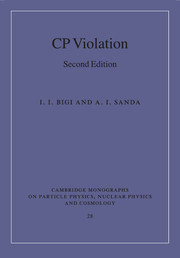Book contents
- Frontmatter
- Contents
- Preface to the second edition
- Preface to the first edition
- Part I Basics of CP violation
- 1 Prologue
- 2 Prelude: C, P and T in classical dynamics
- 3 C, P and T in non-relativistic quantum mechanics
- 4 C, P and T in relativistic quantum theories
- 5 The arrival of strange particles
- 6 Quantum mechanics of neutral particles
- Part II Theory and experiments
- Part III Looking beyond the Standard Model
- Part IV Summary
- References
- Index
1 - Prologue
Published online by Cambridge University Press: 10 March 2010
- Frontmatter
- Contents
- Preface to the second edition
- Preface to the first edition
- Part I Basics of CP violation
- 1 Prologue
- 2 Prelude: C, P and T in classical dynamics
- 3 C, P and T in non-relativistic quantum mechanics
- 4 C, P and T in relativistic quantum theories
- 5 The arrival of strange particles
- 6 Quantum mechanics of neutral particles
- Part II Theory and experiments
- Part III Looking beyond the Standard Model
- Part IV Summary
- References
- Index
Summary
All animals are equal.
But some animals are
more equal than others!
G. Orwell, Animal FarmThe sciences in general and physics in particular are full of fascinating phenomena; this is why they have attracted intense human interest early on and have kept it ever since. Yet even so we feel that the question to which degree nature is invariant under time reversal and CP transformations is so fundamental that it richly deserves its own comprehensive monograph. Two lines of reasoning – different, though not unrelated to each other – lead us to this conclusion. The first relies on multi-layered considerations, the second is based on a property inferred for the whole universe.
The first line of reasoning centres on the important role symmetries have always played in physics. It has been recognized only last century, though, how central and crucial this role actually is, and this insight forms one of the lasting legacies of modern physics to human perception of nature and thus to human culture. The connection between continuous symmetries – like translational and rotational invariance – and conserved quantities – momentum and angular momentum for these examples – has been formulated through Noether's theorems. The pioneering work of Wigner and others revealed how atomic and nuclear spectra that appeared at first sight to be quite complicated could be understood through an analysis of underlying symmetry groups, even when they hold only in an approximate sense. This line of reasoning was successfully applied to nuclear and elementary particle physics through the introduction of isospin symmetry SU(2), which was later generalized to SU(3) symmetry in particle physics.
- Type
- Chapter
- Information
- CP Violation , pp. 3 - 11Publisher: Cambridge University PressPrint publication year: 2009

